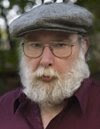 At the urging of my friend Terry Cowan I am reading Love In The Ruins by Southern novelist Walker Percy (May 28, 1916 – May 10, 1990), and it is turning out to be a delightful literary adventure. It is the sort of thing that might have resulted had Hunter S. Thompson been both civilized and educated.
At the urging of my friend Terry Cowan I am reading Love In The Ruins by Southern novelist Walker Percy (May 28, 1916 – May 10, 1990), and it is turning out to be a delightful literary adventure. It is the sort of thing that might have resulted had Hunter S. Thompson been both civilized and educated.Percy was scientifically trained and received his medical degree, yet by the time he had finished his formal education he became convinced that science was utterly incapable of explaining the real mysteries of human existence.
Rather than wear myself out writing a parallel description of what Terry has written, I have decided to follow T.S. Eliot's advice and steal liberally from what my friend posted on his blog found here.
"Love in the Ruins, published in 1971, is a futuristic pre or mid-apocalyptical novel. The age is one of random, inexplicable violence, though in this death-denying culture, the mere mention of the word "funeral" causes embarrassment. The utter banality of American life has broken down every defense. Life revolves around the golf course, which can now be played even at night. Jesus Christ is described as "The Greatest Pro of Them All." The Pro-Am is kicked-off with a "Bible Brunch" and a performance by the Christian Kaydettes. The biggest event in the liturgical calendar is now "Property Rights Sunday." The Catholic Church split into 3 factions: 1. the American Catholic Church (the A.C.C.) based in Cicero, IL which preaches property rights and neighborhood integrity and plays the Star-Spangled Banner at the elevation of the Host, 2. the Dutch schismatics who "believed in relevance, but not God," and 3. the Roman Catholic remnant, where the "monks are beginning to collect books again."
"Politically, the old divisions hold: the conservatives are now the Knotheads (the businessmen), and the liberals the Leftpapas (the federal bureaucrats and the therapists and scientists). On Sunday mornings, the Knotheads go to church and the Leftpapas go on bird-watching expeditions into the woods, hoping against hope of spotting an ivory-billed woodpecker. But other than that, the lives of each group are much the same.
"Therapy is the rule of the day, and pervades every aspect of daily life. Older Americans are shipped off to Tucson or Tampa. If they give any trouble there, they are shuttled off to clinics for more therapy. If this is unsuccessful, the oldsters are sent to the Happy Isles of Georgia, a way-station to self-euthanization.
"The nation as a whole has undergone periodic unrest and riots. The Automobile Age, as it is known, is now a fond memory. There are still cars on the roads, but when they break down, they are just left, as there is now no one to repair them (or anything else.) The nation has been bogged down for the last 16 years in a civil war in Ecuador. All the while, the vines and sumac steadily encroach from the swamps and bayous.
"And everyone pretends that all this is normal--except, that is, for the protagonist, a lapsed Catholic by the name of Dr. Thomas More. He alone, seemingly, realizes the spiritual malaise, and recognizes the swings between pure abstract thought and violence. He seeks to "cure" mankind through his invention, the lapsometer, and believes he can "save the terrible God-blessed Americans from themselves." He hopes his device can perhaps bridge "the dread chasm between body and mind that has sundered the soul of Western man for five hundred years.'"
Early on Percy gets to the heart of the matter: that attitude historians call "the myth of American exceptionalism," which is nothing less than the commonly held belief that we are somehow special in that the forces of economics and history do not apply to us:
"Now in these dread latter days of the old violent beloved U.S.A. and of the Christ-forgetting Christ-haunted death-dealing Western world I came to myself....Is it that God has at last removed his blessing from the U.S.A. and what we feel now is just the clank of the old historical machinery, the sudden jerking ahead of the roller-coaster cars as the chain catches hold and carries us back into history with its ordinary catastrophes, carries us out and up toward the brink from that felicitous and privileged siding where even unbelievers admitted that if it was not God who blessed the U.S.A., then at least some great good luck had befallen us, and that now the blessing or the luck is over, the machinery clanks, the chain catches hold, and the cars jerk forward.?"
And later:
"Even now, late as it is, nobody can really believe that it didn't work after all. The U.S.A. didn't work! Is it even possible that from the beginning it never did work? that the thing always had a flaw in it, a place where it would shear, and that all this time we were not really different from Ecuador and Bosnia-Herzegovina, just richer."
Sound familiar? It should. It seems that Percy was astute in his analysis of the American character---so astute, in fact, that his writing was remarkably prescient.


